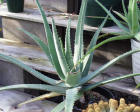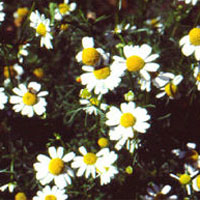 |
|
Chamomile |
 |
|
Chamomile |
Herbs can and should be a cornerstone of your preventive health program. Natural, effective, gentle to the system and with minimal side effects, herbs are a wise choice to ease the aches and pains of common ailments. This information is not meant as medical advice.
Herb Boneset (Eupatorium perfoliatum)
Biochemical Reaction Its volatile oils increase heat and circulation and promote sweating. Boneset is also a digestive and elimination stimulant.
Application Helps relieve aches and pains of colds and flu. Its sweat-inducing properties help bring down fever.
Herb Echinacea (Echinacea angustifolia)
Biochemical Reaction Echinacea's chemical components include volatile oil, caffeic acid, derivatives, polysaccharides, polyines, polyenes and isobutylamides. These contribute to the herb's antimicrobial action. Its efficacy lies in supporting the immune system as it fights bacterial and viral outbreaks.
Application Helps prevent colds and flu and acts as an overall immune system tonic.
Herb Feverfew (Chrysanthemum parthenium)

Feverfew
Biochemical Reaction Feverfew works by inhibiting secretion of compounds_prostaglandins, histamines, platelets and some white blood cells_responsible for pain and inflammation. It's also a vasodilator and relaxant.
Application Eases headache pain including migraines. It's also indicated for arthritis in its painful inflammatory stage.
Herb Garlic (Allium sativum)
Biochemical Reaction Garlic's volatile sulfur compounds including allicin are its active components. Allicin blocks the production of cholesterol thus helping stave off heart disease. Its volatile oils are also strong antibacterial agents that act on bacteria, viruses and alimentary parasites.
Application Helps lower blood cholesterol levels and promotes digestion since it supports natural bacteria in the intestines while killing pathogenic organisms. Garlic also helps chronic bronchitis and colds.
Herb Ginger (Zingiber officinalis)
Biochemical Reaction Ginger is rich in volatile oils, which include zingiberene and zingiberole. These compounds provide stimulant, carminative (helps dispel gas) and diaphoretic (sweat-inducing) properties, thus making ginger an excellent digestive and circulatory aid.
Application Eases nausea, flatulence, diarrhea, dizziness and vertigo. Prevents nausea from morning sickness, stomach flu and motion sickness.
Herb Ginkgo (Ginkgo biloba)
Biochemical Reaction Ginkgo affects neural functions of the brain including stabilization of neural and muscular membranes, removal of toxic metabolites, normalization of transmitter concentrations and maintenance of electrolytes. Its antioxidant properties increase glucose and ATP (adenosine triphosphate) levels, aiding energy levels within brain cells.
Application An effective cerebral circulatory stimulant, ginkgo has been indicated as helpful in early stage Alzheimer's.
Herb Hawthorn (Crataegus oxyacantha)
Biochemical Reaction Considered by herbalists the world's best cardiotonic, hawthorn dilates peripheral blood vessels, increases metabolism in the heart muscle, dilates coronary vessels and improves blood supply to the heart.
Application Helps treat heart disease and mitigate symptoms in early stage heart disease.
Herb Milk Thistle (Silybum marianum)
Biochemical Reaction Stimulates bile flow and thus aids digestion. Milk thistle is noted for its liver protective functions. Silymarin, a group of flavonoids present in milk thistle, protects the liver against the effects of toxins and helps heal liver cells by strengthening cell membranes.
Application Protects and tonifies liver cells, helps promote digestion.
Herb Passionflower (Passiflora incarnata)
Biochemical Reaction Passionflower acts as a natural calming agent by promoting the transmission of subtle nerve impulses.
Application Eases muscle tension and emotional distress and is a sleep-inducer.
Herb Peppermint (Mentha piperita)
Biochemical Reaction Peppermint has a mild anesthetic effect on mucous membranes and helps stimulate liver and gall bladder function, which assists in breaking down fats during digestion.
Application Used as a digestive aid and for gastrointestinal upset.
Herb Saw Palmetto (Serenoa repens)

Passion Flower
Biochemical Reaction Saw palmetto's active constituents of volatile oils and steroids act as diuretic, urinary antiseptic and endocrine agents for the male reproductive system.
Application A male reproductive system tonic (tones and strengthens), say palmetto is effective in treating BPH and infections of the genito-urinary tract.

Saw Palmetto
Herb Valerian (Valeriana officinalis)
Biochemical Reaction Valerianic acid, the active component of valerian, acts as a sedative for emotional disturbances and pain. A nervine, valerian feeds the nervous system and helps balance its energy.
Application Prevents insomnia and eases nervousness and tension.
Sources: Herbal Tonic Therapies by Daniel Mowrey, Ph.D. (Keats), The Way of Herbs by Michael Tierra, N.D. (Washington Square Press), The Herbal Handbook by David Hoffman (Healing Arts) and The Scientific Validation of Herbs by Daniel Mowrey, Ph. D. (Keats).
Nature's Boutique
Natural beauty care products burst with ingredients showcasing nature's intelligence. Leaves, flowers, seeds, essential oils and roots of plants provide beautifying properties to skin, hair and body products without using toxic chemical residues that can dry or damage your skin and hair.
Almond oil A natural oil high in fatty acids, almond oil is absorbed more easily than film-forming mineral oil. It's used in soaps, perfumes and creams.
Aloe vera Gel obtained from the inner tissue of leaves of the aloe vera plant has soothing and healing qualities for the skin and hair. A known burn healer, aloe is a natural oxygenator as it draws and holds oxygen to the skin. It's also a natural astringent.
Avocado oil The oil from the fruit of the avocado plant helps make skin soft and smooth. Contains vitamins A, D and E as well as lecithin, phytosterol and carotenoids.

Aloe vera
Calendula Extracts of calendula (marigold) have a calming, anti-inflammatory effect and promote cell formation. Calendula is used for delicate, sensitive skin and for skin in need of regeneration.
Camphor Oil from the woof of the camphor tree is a topical antiseptic and analgesic. Because camphor discourages swelling, tissues are provided with more nutrients and oxygen, and this leads to faster healing.
Chamomile Extracts from the blossoms of this plant have soothing and restorative properties for both skin and hair. In shampoos, chamomile brings out natural highlights and helps mend split ends.

Chamomile
Eucalyptus An antiseptic and antibacterial, this is a powerful oil used in skin care products. It's also used in liniments, cleansers, and bath oils.
Evening primrose oil An essential oil from the yellow evening primrose, it helps improve the skin when taken internally and applied externally. In shampoos and hair conditioning sprays, the oil removes tangles and repairs damaged hair, adding a natural, nongreasy luster as well.
Grapefruit seed (extract) A natural preservative, grapefruit seed is used for its antifungal and antiviral properties. It's most effective when combined with other preservatives.
Honey Known for its humectant (moisture retaining) properties, honey is a gentle, natural moisture enhancer for hair and skin.
Horsetail Provides a high concentration of silica, which helps seal the cuticle around the hair strand thereby strengthening the hair.
Lavender oil Soothes minor skin irritations and helps release muscle tension. Its pleasant scent is found in hair and skin products.
Lemongrass Essential oil of lemongrass helps balance sebum production and tighten open pores.
Nettles Known for its painful sting and high nutritional value (iron and potassium), nettles, when used in hair care products, helps stimulate hair follicles and regulate hair follicles and regulate scalp oil buildup.

Lavender
Oatmeal A gentle exfoliant that removes dry and dead skin and helps unclog blocked pores.
Peppermint Oil of peppermint contains menthol, a strong aromatic volatile oil. It's used in shampoos to reduce scalp flakiness and in creams, lotions and dentifrices for its cooling and antiseptic properties for the skin and gums.
Plantain A cooling, soothing herb helpful for wounds. Plantain possesses antiseptic, astringent and styptic properties.
Rosemary The essential oil and flavonoids of rosemary have a stimulating and strengthening effect on hair and skin. Rosemary helps stimulate blood circulation.

Peppermint
Rosewater Obtained from the extraction of rose oil, it has a honey and rose scent and is slightly antiseptic. Traditionally, rosewater has been used for soothing irritated skin.
Sage oil Constituents of sage have an anti-inflammatory, slightly astringent and stimulating effect. Sage also aids in wound healing.
Seaweed Used in skin and hair care products, various forms of sea vegetables contain a wide range of trace minerals, vitamins and amino acids. Seaweed has a nourishing, detoxifying and healing effect on the skin.
Shea butter A fatty substance derived from the berry-like nuts of the African karite tree, shea butter is a natural cellular renewal ingredient with moisturizing and nourishing abilities. In high enough quantities, it has sun protection properties.
 St.
John's wort An oil extract derived from the leaves of this herb has a stimulating and tightening
effect on the skin. St. John's wort has astringent, anti-inflammatory and antibiotic properties as
well.
St.
John's wort An oil extract derived from the leaves of this herb has a stimulating and tightening
effect on the skin. St. John's wort has astringent, anti-inflammatory and antibiotic properties as
well.
Tea tree oil From the pressed leaves of the Australian melaleuca tree, tea tree oil is a safe and effective natural antiseptic that's antimicrobial and antibacterial. It's used in skin care products for acne, psoriasis, dermatitis and other skin irritations and in shampoos and rinses for flaky scalp conditions.
Vitamins A and E Their antioxidant properties make vitamins A and E excellent preservatives in natural cosmetics. Vitamin A prevents dryness and scaliness of skin and hair and aids in retention of moisture by the skin. It's essential for normal functioning of the skin, and local application can help treat rashes and skin ulcers. Vitamin E has skin-softening, stimulating and soothing properties and promotes growth of tissue.
Sources: Rohstoff-Fibel Ingredients Dictionary (Annemarie Borlind), What's in Your Cosmetics? by Aubrey Hampton (Odonian Press), Feather River Company Catalog and Zia Cosmetic Ingredient Dictionary.
Reprinted with permission from the August 1996 issue of Delicious! Magazine, a publication of New Hope Communications, Boulder Co.

Butcher's Broom